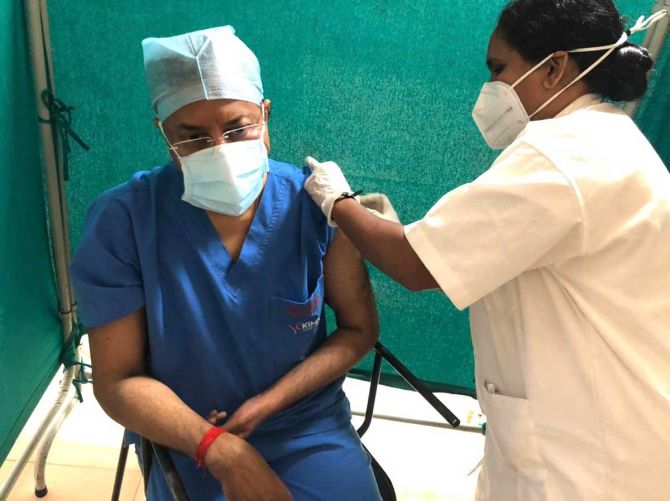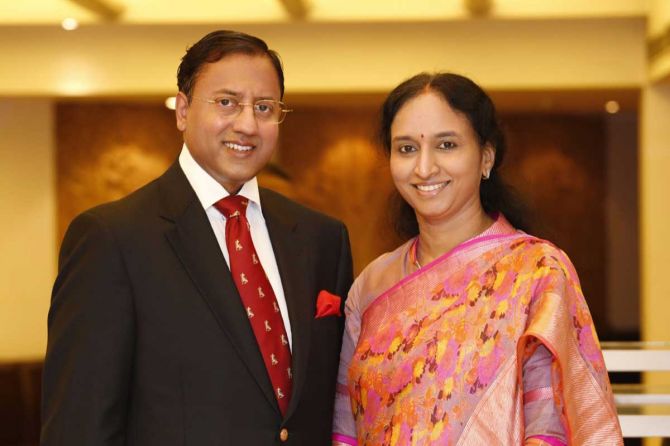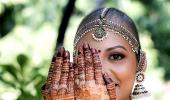'Having dedicated my life towards improving breast healthcare in my motherland.'
'I shall continue to work with rock-solid determination following this "chosen" path.'

He was speechless.
Unusually so.
Thunderstruck.
Totally robbed of words for a few minutes.
That is his enduring memory of a crucial heart-stopping moment from last year.
It unfolded like this: Surgeon Dr Raghu Ram Pillarisetti, 54, was at his office on Minister road, very close to Hussain Sagar lake, at KIMS-Ushalakshmi Centre for Breast Diseases, Secunderabad, on a Saturday morning in December, when his phone rang.
On the other end was Jan Thompson, acting British high commissioner to India, informing him, in the strictest confidence, that her majesty, the queen had graciously approved his appointment as an 'Officer of the Most Excellent Order of the British Empire' in the forthcoming New Year 2021 Honours list.
The call was followed up with an official letter on e-mail.
"It was surreal and I was at a loss of words," he muses, as he recollects that memorable split-second that had him jumping over the moon with happiness.
Receiving intimation that he would shortly be appointed an OBE was easily one of the best days of his devoted doctorly life. (OBE is the second highest ranking British honour excluding a peerage/knighthood/damehood.)
As per the letter from the British high commission in Delhi it was recognition for Services to improving breast cancer care and surgical education in India and to UK/India relations.
"By the grace of Lord Almighty I have achieved the very rare distinction of becoming one of the youngest surgeons of Indian origin, in over 100 years, to be honoured by her majesty, the queen with an OBE. My family and I were overwhelmed with joy."

He could not share the news of the honour till after December 30, when his name would feature in the London Gazette, the official publication of the Crown.
The OBE is not Dr Raghu Ram's first significant honour in acknowledgement of his years of gallant work.
The earnest surgeon, who has dedicated his life to caring for and protecting women from breast cancer, is also the recipient of a Padma Shri in 2015 and the Dr B C Roy National Award in 2016.

For Dr Raghu Ram -- who is a Hyderabad boy and has 10 titles after his name, ranging from four FRCSs, Edinburgh, England, Glasgow and Ireland to an MS -- medicine and his work have been his religion and he a faithful follower.
He studied medicine in Vijayawada and did his post-graduate degree in surgery from Mangalore, before heading for British shores for "higher surgical training."
A decade later he returned to India to establish the breast centre at KIMS, Hyderabad, and start up his Indian career, as well as build for himself a conscientious role that embraced surgery, patient care, teaching and, most important of all, advancing awareness about breast cancer.
His efforts towards building mindfulness around breast cancer have also involved bringing Indian breast surgeons together through the Association of Breast Surgeons of India, "thus paving the path towards standardising breast healthcare in the country."

Why do you feel your work was recognised and it found a place on the Queen Elizabeth II's 2021 New Year's Honours list?
How do you think it got noticed by the British government?
Self-nominations are not allowed in the British honours system, so, I am not aware how my work, happening outside of the UK, got noticed by the British government.
I can, however, proudly state that I have been a living bridge, between India and the UK for the past two decades. The innovative and impactful initiatives implemented by me, over the past 20 years, that replicated the best of British medical practices, must have come to their notice.
I am deeply grateful and incredibly humbled to be considered worthy of this high honour, conferred by her majesty, the queen.
In 2002, whilst working at the Cardiff Breast Unit (Wales), which is one of the foremost breast health centres in the United Kingdom, my mother, Dr Ushalakshmi (who was back in India), was diagnosed with breast cancer.
Being the only child, I was profoundly affected by her illness. At the time, whilst making enquiries about her treatment in India, I realised that due of lack of awareness and absence of an organised screening programme, more than 60 per cent (women who had breast cancer) present in the advanced stages.
My wife, Dr Vyjayanthi, and I had lucrative career opportunities in the UK, but we relocated to India in 2007 to take care of my aging parents.
For well over a decade, I have been working with missionary zeal, alongside colleagues, friends and the government, to (institute UK standards), in an endeavour to improve the delivery of breast healthcare in the country where I was born and raised.
What will the receiving of this award entail?
In a pandemic year there will be no going to Buckingham Palace to receive the award?
After the pandemic settles down, I am very much looking forward to visiting London and to the very special day where I would be formally receiving the OBE award medal from her majesty, the queen at an investiture ceremony at Buckingham Palace.

Do you hail from a family of doctors?
Where did you grow up and why did you become a doctor?
Both my parents are doctors.
My father, who recently left this world, was a renowned surgeon and my mother is a well-known obstetrician and gynaecologist from Hyderabad.
I am their only child. My paternal grandfather was also a doctor. So, there are three generations of doctors in the family!
As both my parents are doctors, I have seen, first hand, the enormous impact that the art and science of medicine has upon patients, in their treatment and in alleviating the suffering of those (laid low by) various ailments, some of which are serious and even life threatening.
In no other profession can one derive the satisfaction of healing and saving lives.
I was immensely inspired by my parents, who consistently demonstrated -- through their actions and deeds -- the ethical practice of medicine, always keeping the good of the patient as their highest priority.
And hence, from my childhood, I wanted to become a surgeon and emulate them and their kind deeds.
What does the average educated Indian not know about breast disease?
What would be the most pertinent facts to show how serious an issue is it at both the rural and metro level?
This disease ranks as the Number 1 cancer among Indian women, with around one in 22 women affected, half of whom will die from the disease.
In India, well over 162,000 women are newly diagnosed with breast cancer every year -- a staggering number that has overtaken cervical cancer to become the most common cancer affecting women.
Why did this happen?
The precise answer -- no one really knows.
But contributing factors: late marriages, late pregnancy (after age 30), not breast feeding, obesity, sedentary lifestyle, prolonged use of HRT (hormone replacement therapy) after menopause, alcohol and smoking are some of the risk factors that have contributed to the rising numbers.
Essentially, any factor that increases the exposure of estrogen hormone to the breast for a prolonged duration can potentially be a risk factor for developing breast cancer.
Contrary to the Western world, where breast cancer is common after the age of 50, the highest incidence of breast cancer in India is between the ages of 40 and 50 -- at least a decade earlier.
Why are Indian women affected earlier by breast cancer?
Has research shown any reason?
Again, no precise answers.
Life expectancy in India for men and women is a decade less -- around 69 and 70.7 for women (2018) -- compared to the West (UK: 81 years, USA: 79 years). That is probably the reason why breast cancers present in younger women in India ie higher number of women in a younger age group in India compared to the West.
More than 87,000 women succumb to breast cancer every year -- a woman dies of breast cancer every ten minutes in India.
The average educated Indian thinks most breast lumps are cancers. The fact is only one out of 10 breast lumps are cancers.
Through a process of triple assessment - clinical breast examination, bilateral mammogram, ultrasound and core needle biopsy, it is possible to, equally, firstly, reassure the vast majority of women, who in fact have benign breast disease, and secondly, to accurately diagnose those who have breast cancer.
Up until 2012, cervical cancer was more common in rural India and breast cancer in urban India. But, over the past several years, breast cancer has (surpassed the incidence of) cervical cancer to become, as I said, the commonest cancer affecting women in both urban and rural India.
Sadly, breast cancer is a 'closet' issue in our country, particularly in rural India. Unlike the UK and other Western countries, India does not have a robust or organised population-based breast cancer screening programme.
Lack of awareness and absence of such a screening programme are the two primary reasons why more than 60 per cent women present breast cancer only in the advanced stages.

Do you agree that more awareness is needed among all categories of public?
Indeed.
I must place on record that much has been achieved over the past 13 years in an earnest endeavour to transform breast cancer from a 'taboo issue' to a much more commonly discussed one.
Ever since the Ushalakshmi Breast Cancer Foundation (of which Dr Raghu Ram is the director) introduced their innovative pink ribbon campaign and the Pink Ribbon Walk in 2008, I am absolutely thrilled and delighted that many NGOs and hospitals have also embarked upon conducting similar programmes, not only for breast cancer awareness, but for other illnesses as well, which also desperately need urgent attention.
This speaks volumes -- the pink ribbon campaign has enthused individuals, organisations and institutions to take up and spearhead impactful awareness activities.
I am so very happy that the foundation has contributed in a big way to the 'awareness' journey.
However, much more needs to be done.
There is still a significant proportion of people, even amongst the educated, who shy away from visiting a doctor, when they notice a lump in the breast.
There is also a fine line between advocacy and creating a scare.
Having stated this, realistically, there are only three ways to fight breast cancer.
Firstly, to eat right, exercise right and lead a healthy, balanced life.
Secondly, women of all ages to be 'breast aware' and to report to a doctor without delay should they notice any new breast health issues.
Thirdly, women, 40 and over, must have a screening mammogram every year.
This three-pronged strategy would ensure early detection and translate into significantly improved long term survival.
In summary, if breast cancer is detected very early -- in the impalpable stage -- before the woman or the doctor can feel the lump (screen-detected breast cancer), with appropriate treatment, one can be rest assured that she will only succumb to old age and not cancer.
But if it were not post discovering lumps, why would a woman be visiting a breast specialist/doctor?
If the woman cannot feel a lump in the breast, why would she be visiting a doctor in the first place?
What is the advantage of screening mammogram?
That's the whole point of screening - to detect cancer very early before a lump is felt by the woman.
A mammogram (X-ray of the breast) is done to detect breast cancer in the impalpable stage, when neither the woman nor the doctor can feel a lump in the breast. It is advisable to have a screening mammogram once every year after the age of 40.
Breast screening by way of a mammography is an effective proven way of detecting breast cancer early many years before it shows up.
Early detection of breast cancer offers the best chance of successful treatment, which translates to significantly improved survival.
Firstly, women of all ages must be 'BREAST AWARE' and report any changes to a specialist without delay.
Secondly, women aged 40 and over must have a screening mammogram, at least once in two years, ideally every year. Early detection ensures excellent prognosis and long-term survival.
On an average how many surgeries do you conduct in a week or a month?
My philosophy relating to numbers: Numbers are not important to me as practicing surgery is just one component of my life. Being in the rat race of practice is not my cup of tea.
In my personal view, operating on the highest volume of patients or seeing highest number of patients, each day, is not an achievement in itself.
Leading a balanced life is. We must not forget, on a daily basis, that we come into this world with nothing and, leave also with nothing.
What matters is how well we live and that's a balancing act, which one has to consciously reflect on regularly.

What is the most satisfying part of your work?
The most satisfying part of my work, for well over a decade, is being able to make a significant and meaningful difference to the delivery of breast healthcare in my country.
This happened only because of the collective outstanding efforts and phenomenal contribution from the board of directors at KIMS Hospitals, my colleagues, the government, friends, and above all, my family, who have stood rock solid behind my vision and mission.
I dedicate this astonishing moment and tremendous recognition to them, and, equally, to my patients who have given me the unique privilege to be involved in their care.
My final thoughts and message to the world is: A former editor of a national daily mentioned to me many a times that I should take up the cause of other cancers as well, along similar lines.
To this, I humbly responded with Swami Vivekananda's quote that has now become part and parcel of my life: 'Take up one idea. Make that one idea your life... Think of it, dream of it and live on that idea... Let the brain, muscles, nerves, every part of your body be full of that idea, and, just leave every other idea alone'
The lord made me realise, through my mother's illness, that I am meant to be in India, and not in the United Kingdom.
He then created a path for me, and every moment, is guiding me along his chosen path placing me in the right place at the right time and is making me do all the right things in record time.
Having dedicated my life towards improving breast healthcare in my motherland. I shall continue to work with rock-solid determination following this "chosen" path.
(Receiving) the Queen's Honour has well and truly added fire in my belly to make an even greater impact as I improve breast healthcare in Mother India, my country.
I would like to echo John F Kennedy's words to his fellow Americans, that relate to Indians, through a very poignant and thought-provoking speech given by the late Dr Abdul Kalam, the former president of India: 'Ask what we can do for India and do what has to be done to make India what America and other Western countries are today'.

Feature Presentation: Ashish Narsale/Rediff.com












 © 2025
© 2025